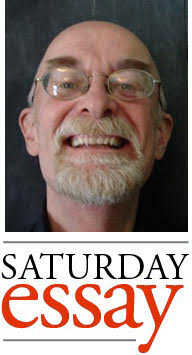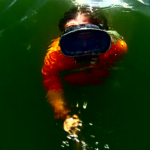I Wonder
 Long it’s been known the galaxy is a big place, but until 1922 it was thought the Milky Way was all there was. Then Edwin Hubble climbed Mount Wilson and had a look-see through the Hooker Telescope and realized those cloudy objects in the sky called “nebulae” were actually galaxies unto themselves. Later, a telescope named for Edwin himself beamed back the Deep Field images of a polkadot infinity. Ten thousand galaxies in a patch of sky one tenth the size of a full moon. Why weren’t people jumping up and down when we went from a hundred billion stars (no paltry sum) to a hundred billion visible galaxies, as far as the Hubble can see? From a distance you could mistake the Deep Field photos for a sky full of stars, but squint and see galaxy after galaxy shimmering in the void. When I notice one swirling down the drain of time, just like ours, I think, “hey — spiral galaxy — my people!”
Long it’s been known the galaxy is a big place, but until 1922 it was thought the Milky Way was all there was. Then Edwin Hubble climbed Mount Wilson and had a look-see through the Hooker Telescope and realized those cloudy objects in the sky called “nebulae” were actually galaxies unto themselves. Later, a telescope named for Edwin himself beamed back the Deep Field images of a polkadot infinity. Ten thousand galaxies in a patch of sky one tenth the size of a full moon. Why weren’t people jumping up and down when we went from a hundred billion stars (no paltry sum) to a hundred billion visible galaxies, as far as the Hubble can see? From a distance you could mistake the Deep Field photos for a sky full of stars, but squint and see galaxy after galaxy shimmering in the void. When I notice one swirling down the drain of time, just like ours, I think, “hey — spiral galaxy — my people!”
Aldous Huxley considered the brain and nervous system a necessary reducing valve providing a “measly trickle of consciousness” shunted from “Mind at Large.” Necessary because you can’t go around immersed in Mind at Large while trying to pay the bills. So we float like croutons on the bottomless deeps, and notice what we can.
Never mind the Mind at Large and forget the Deep Field. What’s amazing is our ability to stifle our amazement, making molehills from mountains of mystery.
The so-called Seven Wonders of the Ancient World were comprised of the pyramids, a garden, a couple of statues, a temple, a mausoleum and a lighthouse. Not bad. The pyramids are wonderful still. And with atoms split and genes spliced we continue on a roll in the yowza department. But one thing I can’t get over is radio. Push a button and pull sound from the air. No big deal? It’s been going on for over a century. Predicted mathematically in 1867, demonstrated twenty years later and put into use the following decade, radio waves move at the speed of light, following the contours of the earth or bouncing off the ionosphere. Johnny Cash sang into a microphone and the syllables and melody carried on his breath were converted into audio signals, combined with radio waves, and broadcast over mountains or careening off the sky. Go, Johnny, go! All that was needed was an antenna tuned to a sympathetic frequency and you could fish his voice from the air with your net of electrons. Catch it if you can as his baritone flies by, regardless if you’re tuning in or not.
Of course neither the Seven Wonders nor these modern whiz-bang reveals can rival the wonders of Earth. Threaten, yes, but not rival. If you were designing a planet would you make all of life dependent on a single element? Would this element appear as a trifecta, flowing as a river then rising as a vapor, forming million-pound reservoirs lofting artfully across the sky? Would it thus deliver the goods to thirsty pines and sparrows? Could you dream up these sunlit lanterns passing in procession, never twice the same? And for that season we skirt the frozen edges of existence, would you have thought to freeze your aqua vitae until it’s needed by the trees, when we tilt towards the sun once more?
I am astonished by what a former neighbor once referred to as, “Those nasty black birds!” The crows. Didn’t she know they’re one of the most intelligent things on wings? I was driving home one day, and at the intersection where I leave the main drag there was a crow sitting on an overhead wire. As I turned up the avenue it lifted off and I watched it fly straight (“as the crow flies”) to the power line behind our house, where it waited patiently for me to go inside and get its peanuts (unsalted, in the shell.) It’s known that corvids recognize human faces, and apparently they recognize red Toyotas, because they are smart, smarter than dogs and rivaling some primates. New Caledonian crows have been fashioning and using tools for so long they have evolved straighter beaks and eyes set closer together, all the better to wield their twigs. And there’s an Aesop’s fable about a thirsty crow who can’t reach the water at the bottom of a pitcher, so it displaces the liquid by dropping in stones until it rises to a drinkable level. Real crows do that too. They are much more likely to live in town than their shy and burley country cousins — the ravens — who, with their whistles, chirps and chortles, posses a variety of vocalizations second only to humans. Yet corvids are often lumped together with pigeons and seagulls and whoever shits where they’re not welcome. They do get into unsecured trash, eat baby birds, and posses a goth aura from pecking at seed corn and the battlefield dead, but they’ll bring presents to humans, and I have found shiny objects in the driveway, though I can’t prove it was they, and not the wind which left them.
Obviously animals are amazing. And not just the charismatic megafauna of our infatuations. Even the squirrels, seagulls and pigeons. Even those role-models for us underachievers everywhere — house cats. And the human animal is no different. There’s a piano player living in London who can hear a piece of music once, anything from Mozart to Jelly Roll Morton, and play it note for note. And never forget it. He can play any tune years later, chosen from the tens of thousands waiting in his brain. Oh, and by the way, he’s blind. And severely mentally disabled since birth. He can’t feed himself or button his shirt, but boy that man can play.
Take a hard look at anything, from a grain of sand to a dandelion, and you’ll open a can of wonder-worms. Energy masquerading as particles builds the atoms which build our world. Might as well say the Earth rests on the back of a giant turtle. And beneath that turtle, another one. As it’s been said, “It’s turtles — all the way down.”
Give me back my measly trickle of the everyday. Hand me my dullard’s blinders before my head explodes. And for heaven’s sake never mind death.
A Sufi once insulted a king by referring to his palace as a “caravanserai,” a wayside rest for travelers. When the king took umbrage the Sufi said, “Look, your grandfather stayed here and moved on. Your father stayed here and moved on. One day you yourself will leave. This is obviously a caravanserai.” Well, our silk-road’s running one-way, and no one’s returned from waysides beyond. We know nada, and seem uncomfortable with this. This mystery. This lack of a story or glimpse of a knowable future. Even while writing this I can feel my head-chakra merging into my butt-chakra. Yet the words still come! From this darkness drift the vapors of make-believe. From this wellspring of seers comes their knowledge of death! Has it ever been elsewise? I wonder.
Recommended Links:
Leave a Comment
Only registered members can post a comment , Login / Register Here













4 Comments
vicarious
about 8 years agoHelmut Flaag
about 8 years agoRobert Lillegard
about 8 years agoDave Sorensen
about 8 years ago